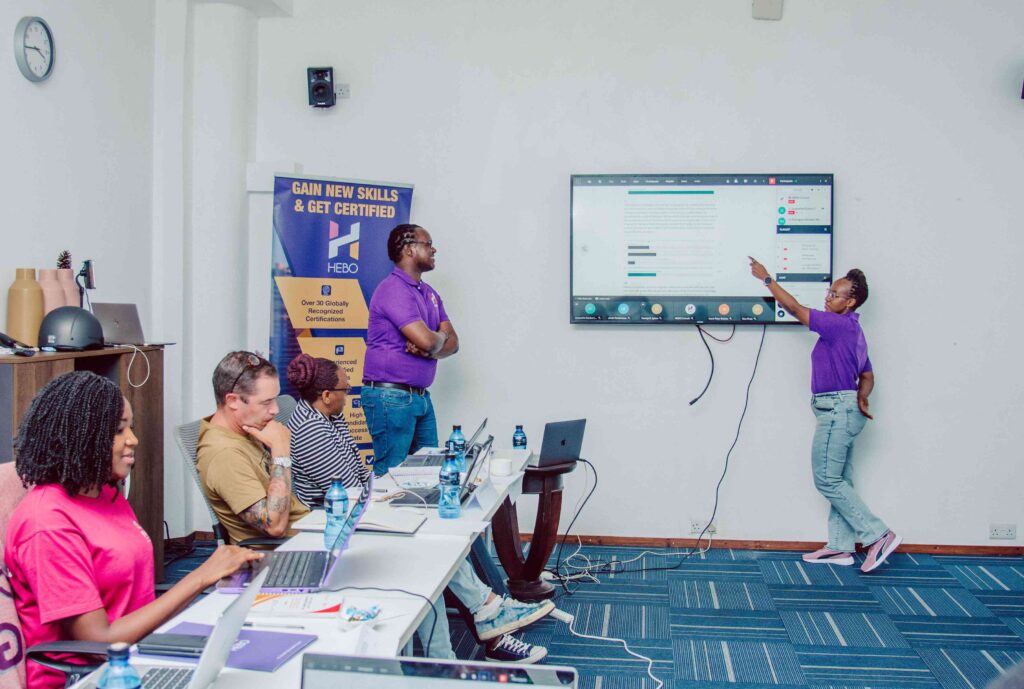The future isn’t something you sit around waiting for. The future is the reality you decide to create.
Imagine someone with a gigantic magnifying glass coming into your business, zooming into it to identify your specific business needs, spot business problems, and finally recommend solutions that deliver value to the participants or stakeholders. The Professional Business Analyst® empowers you to be just that person; giving you the knowledge, skills, tools, and techniques to determine problems and identify business needs.
Professional Business analyst has become a competency of critical importance to project management. Becoming certified as a business analysis (BA) expert can move your career in a fresh direction while opportunities for BAs are on the rise. Inaccurate requirements gathering consistently ranks in the top three causes of project failure yet only half of the organizations have the resources in place to perform this function properly, according to our Pulse of the Profession® research.
If you work with project teams and manage requirements or product development, or if you’re a project or program manager who performs business analysis in your role, then the PMI-PBA® certification is right for you.
PMI – PBA® Examination Content Outline (ECO)
PMI provides potential exam takers with the ”PMI – PBA® Exam Content Outline” (ECO) as a resource. This outline is a content source for
The PMI – PBA® exam questions
Outline your PMI – PBA® exam prep plans
What is PMI – PBA® Certification?
It’s time to become the certified expert your organization needs. If you work with stakeholders in defining requirements, shaping project outputs and driving intended business outcomes, the PMI Professional in Business Analysis (PMI-PBA®) will spotlight your valuable skills.
Business analysis has become a competency of critical importance to project management. Becoming certified as a business analysis (BA) expert can move your career in a fresh direction while opportunities for BAs are on the rise.
The PMI-PBA® represents a deep knowledge in project management.
business professionals are in demand across industries and sectors
Earn more. Be more. Get your PMI-PBA®. Demonstrate you’re one of the best.
PMI-PBA® is a stand-out solution to set you apart in our current world of work

Why PMI – PBA®?
The median salary for project professionals is 16% higher globally (and 32% higher in the United States) than those without it.
PMI – PBA® shows you have the skills to drive business results and increase your organization’s impact in the office and around the world.
The PMI-PBA® adds value
The PMI-PBA® delivers benefits
The PMI-PBA® proves you work smarter
HEBO PMI – PBA® Training Program
At HEBO Consult, we offer both scheduled training programs and on demand PMI – PBA® preparation training course that follows the updated PMI – PBA® Exam Content outline to train and prepare you to pass the PMI – PBA® exam and get PMI – PBA® certified. Hurray!
Our program does not just take participants through the course, but coaches and prepares you to PASS the PMI – PBA® and become an expert in managing projects in any industry. This training course qualifies you for 35 contact hours of training, which is a pre-requisite for the PMI – PBA® exam.
Am I Eligible?
Earning your PMI – PBA® Certification is a commitment, and that’s why it is valuable. Before you apply, make sure you meet of the following sets of PMI – PBA® Certification requirements:
Secondary degree (high school diploma, associate’s degree
60 months of business analysis experience
35 hours PMI – PBA® course training from HEBO Consult – an Authorized Training Partner of PMI with industry experience
OR
Bachelor’s degree or the global equivalent
36 months of business analysis experience
35 hours PMI – PBA® course training from HEBO Consult – an Authorized Training Partner of PMI with industry experience
Course Content
The content covered in this course will allow you to learn valuable principles of business analysis you can apply right away. The course also fulfills a portion of the training requirement for the PMI-PBA® certification, and count as professional development units (PDUs) helpful in meeting continuing education needs for credentials like the PMP®.
Domain 1: Needs Assessment
The Needs Assessment domain includes activities related to understanding a business problem or
opportunity and evaluating various inputs to help develop an effective solution.
Task 1: Define or review a business problem or opportunity using problem and opportunity analysis techniques in order to develop a solution scope statement and/or to provide input to create a business case.
Task 2: Collect and analyze information from a variety of sources using valuation tools and techniques to contribute to determining the value proposition of the initiative.
Task 3: Collaborate in the development of project goals and objectives by providing clarification of business needs and solution scope in order to align the product with the organization’s goals and objectives.
Task 4: Identify stakeholders by reviewing goals, objectives, and requirements in order that the appropriate parties are represented, informed and involved.
Task 5: Determine stakeholder values regarding the product, using elicitation techniques in order to provide a baseline for prioritizing requirements.
Domain 2: Planning
The Planning domain focuses on the preparation required to effectively manage the business analysis
activities that will occur within the project. This includes establishing tools, policies, and procedures for
the requirements management plan, requirements traceability, change management, document control,
and acceptance criteria.
Task 1: Review the business case, and the project goals and objectives, in order to provide context for business analysis activities.
Task 2: Define strategy for requirements traceability using traceability tools and techniques in order to establish the level of traceability necessary to monitor and validate the requirements.
Task 3: Develop requirements management plan by identifying stakeholders, roles and responsibilities, communication protocols, and methods for eliciting, analyzing, documenting, managing, and approving requirements in order to establish a roadmap for delivering the expected solution.
Task 4: Select methods for requirements change control by identifying channels for communicating requests and processes for managing changes in order to establish standard protocols for incorporation into the change management plan.
Task 5: Select methods for document control by using documentation management tools and techniques in order to establish a standard for requirements traceability and versioning.
Task 6: Define business metrics and acceptance criteria by collaborating with stakeholders for use in evaluating when the solution meets the requirements.
Domain 3: Analysis
The Analysis domain centers on requirements management activities. Tasks include the elicitation, analysis, decomposition, acceptance, approval, specification, and validation of the requirements for a product or project.
Task 1: Elicit or identify requirements, using individual and group elicitation techniques in order to discover and capture requirements with supporting details (e.g., origin and rationale).
Task 2: Analyze, decompose, and elaborate requirements using techniques such as dependency analysis, interface analysis, and data and process modeling in order to collaboratively uncover and clarify product options and capabilities.
Task 3: Evaluate product options and capabilities by using decision-making and valuation techniques in order to determine which requirements are accepted, deferred, or rejected.
Task 4: Allocate accepted or deferred requirements by balancing scope schedule, budget, and resource constraints with the value proposition using prioritization, dependency analysis, and decision-making tools and techniques in order to create a requirements baseline.
Task 5: Obtain sign-off on requirements baseline using decision-making techniques in order to facilitate stakeholder consensus and achieve stakeholder approval.
Task 6: Write requirements specifications using process (such as use cases, user stories), data, and interface details in order to communicate requirements that are measurable and actionable (that is, suitable for development).
Task 7: Validate requirements using tools and techniques such as documentation review, prototypes, demos, and other validation methods in order to ensure requirements are complete, accurate and aligned with goals, objectives, and value proposition.
Task 8: Elaborate and specify detailed metrics and acceptance criteria using measurement tools and techniques for use in evaluating whether the solution meets requirements.
Domain 4: Traceability and Monitoring
The Traceability and Monitoring domain includes the activities related to managing the life cycle of
requirements. The tasks within this domain comprise the continuous monitoring and documenting of
requirements as well as the communication of the requirements status to stakeholders.
Task 1: Track requirements using a traceability artifact or tools, capturing the requirements’ status, sources and relationships (including dependencies), in order to provide evidence that the requirements are delivered as stated.
Task 2: Monitor requirements throughout their lifecycles using a traceability artifact or tool in order to ensure the appropriate supporting requirements artifacts (such as models, documentation, and test cases) are produced, reviewed and approved at each point in the lifecycle.
Task 3: Update a requirement’s status as it moves through its lifecycle states by communicating with appropriate stakeholders and recording changes in the traceability artifact or tool in order to track requirements towards closure.
Task 4: Communicate requirements status to project manager and other stakeholders using communication methods in order to keep them informed of requirements issues, conflicts, changes, risks, and overall status.
Task 5: Manage changes to requirements by assessing impacts, dependencies, and risks in accordance with the change control plan, and comparing to the requirements baseline in order to maintain the integrity of the requirements and associated artifacts.
Domain 5: Evaluation
The Evaluation domain includes activities that relate to the assessment of how well the delivered solution fulfills the requirements and meets the business need. Tasks within this domain include testing the solution, determining if there are gaps, and obtaining sign-off.
Task 1: Validate the solution’s test results, reports, and other test evidence against the requirements acceptance criteria in order to determine whether the solution satisfies the requirements.
Task 2: Analyze and communicate the solution’s identified gaps and deltas using quality assurance tools and methods in order to enable stakeholders to resolve discrepancies between solution scope, requirements, and developed solution.
Task 3: Obtain stakeholder sign-off on the developed solution using decision-making techniques in order to proceed with deployment.
Task 4: Evaluate the deployed solution using valuation techniques in order to determine how well the solution meets the business case and value proposition.
Upcoming PBA® Classes
Register here for upcoming PBA® training classes
What you will get in this program?
Official Course Material
Practice tests for the Exam
Certificate (35 Contact Hours )
Student Handbook
PMI® Certified and experienced Instructors
Active Study Group
Group Training
Do you have unique needs for your team and are interested in training as a group? With group training, you will enjoy a tailored learning experience and favorably discounted rates to fit your budget and team dynamics.
What do you need to prepare for this course?
Reliable internet access
A free account with PMI®
A computer with headset and microphone
Access to Microsoft Office applications
Reviews From Our Clients
Just passed my PMP® thanks to HEBO! Would highly recommend for anyone looking to pursue their PMP® in Tanzania. They provide a great structure to keep you on track and prepare for the exam. Martin, Bulla and the team are wonderful ☺️

TARA PINTO
PMP® CERTIFIED
Working with the entire Hebo Team – Martin, Bulla, and the whole team – was great! Excellent course and preparations to successfully learn the information and successfully pass the PMP® exam. I would highly recommend taking their PMP® course.

JESSICA HAWK
PMP® CERTIFIED
HEBO Consult is a top-notch facilitator with the best in class facilities to help you attain your PMP. They are equipped with the most qualified trainers and they are always supportive through your journey to be a certified PMP. I would really recommend HEBO Consult to anyone who is thinking of pursuing PMP.

RENICO KINEMO
PMP® CERTIFIED
PMI-PBA® – FAQs
Other Certifications Programs
With Project Management certifications designed for all experience levels, there’s always an optimal next step to enhance and accelerate your career.